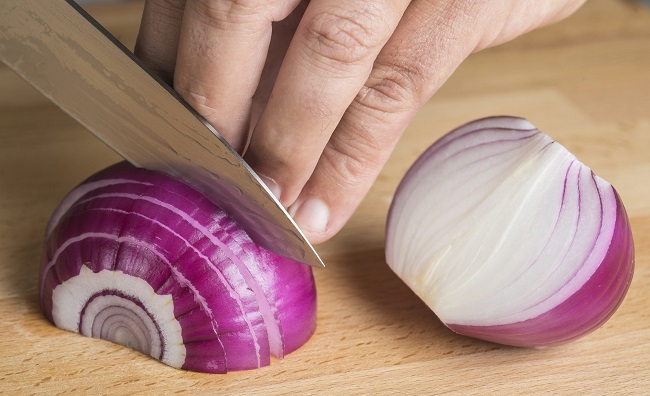White, red, and yellow onions, as well as spring onions and other variations, are just a few of the colours and types of onions available.
Also, while each variety has its own signature taste, they all have the same aromatic undertones.
Red onions are more mild in flavour and work well in raw salads, while white onions can be used to create a delicious stir-fry with other vegetables.
Exactly exactly contributes to the odour, though? Did you know that an onion only has a pungent odour after being cut, but not before?

There must be an explanation behind that. This article investigates the origins of the pungent odour of onions.
Read Also:
What Gives Onions Their Distinctive Smell?
There are countless unique kinds of onions. They come in a wide variety of textures and flavours, including sweet, sour, soft, crunchy, tangy, and savoury.
Onion aroma and taste are both enhanced by how recently they were harvested. Raw onions, when plucked from the ground, have no discernible odour, which may come as a surprise to the uninitiated.
Where do we stand now, then? Molecules in onions have a distinct chemistry, containing a great deal of sulphuric compounds.
Sulfur is not just the culprit behind your eyes watering every time you cut an onion, but also the source of the onion’s pungent aroma and flavour. The thiosulfinates is the chemical term for these substances.
The level of pungent aroma and flavour in your onion is determined by its cultivar and the amount of sulphur in the soil.
Early spring-gathered spring onions are often milder in flavour than storage onions harvested in late summer or early fall.
Does Onion Flavor Change When Cooked?
Onions lose some of their flavour when cooked, and the flavour changes depending on how they are cooked.
The aroma and taste of onions are released when they are cut into smaller pieces. As a result, the onion’s flavour improves as its texture becomes finer.
The onions’ taste is also affected by the level of heat used. Overheating onions causes a variety of chemical reactions that disrupt the onion’s natural structure.
The longer the onion cooks, the more time the reactions have to take place, making the onion more flavorful and mild.
To illustrate, consider cooking onions in a variety of ways, including by boiling, sautéing, and caramelising. Onions require a higher temperature and more time on the heat source when they are boiled.
When food is cooked at a higher temperature for a longer period of time, it undergoes a series of chemical processes that make the flavour mellower and more complex.
Read Also:
- How Old Do You Have to Work at Dollar General
- Best Social Media Reactions from OU’s 55-48 win Over Texas
Conclusion
Onions emit their characteristic odour because they contain sulphur compounds. Onions’ pungent odour comes from volatile sulphur molecules.
Onions take up sulphur from the ground as they develop, and when they are harvested, the resulting compounds are released into the atmosphere.
In addition to the presence of sulphur compounds, onions’ behaviour of causing tears while chopping is the reason why they are so pungent.


















































